The adoption of electric vehicle (EV) chargers is rising in Bangladesh, reflecting global trends toward cleaner, more environmentally friendly transportation. But one pressing question remains for many homeowners: “Can my electrical panel handle an EV charger?”
If your home sports a 200 amp panel or higher, it’s likely equipped to handle the demands of a faster Level 2 EV charger without additional upgrades. For those considering slower Level 1 chargers, rest easy knowing that most existing home electrical systems are up to the task.
Are you curious to learn more? Here is a closer look at the specifics of electric vehicles and how you can ensure your home is ready for the coming revolution.
What’s the Function of Household Electrical Panel?
Every Bangladeshi home has an electrical panel that distributes electricity. It safely directs electricity from the main line to various circuits throughout the house. This ensures that appliances and lights receive the power they need to function.
When a circuit is overloaded, the electrical panel steps in to prevent potential hazards. It does this by tripping the circuit breaker and cutting off power to the affected area. Regular maintenance of this panel ensures your home’s electrical safety and efficiency.
How the Electrical Panel and EV charger is Connected?
To power up an electric vehicle, the EV charger needs to be integrated with your home’s electrical panel. This connection allows the charger to draw electricity safely and efficiently. Professionals must perform this installation to ensure it meets all safety standards.
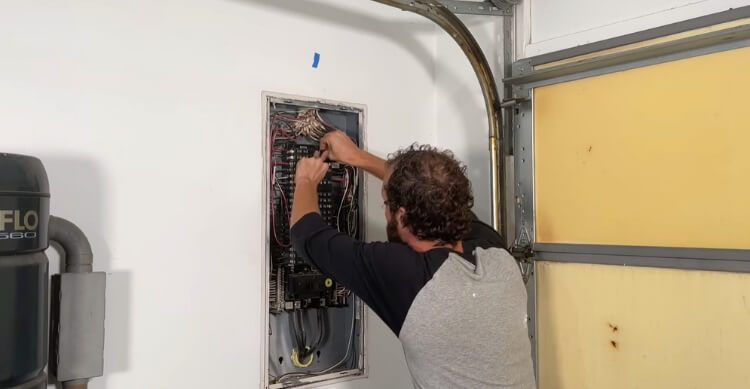
Once connected, the charger uses a dedicated circuit from the electrical panel, similar to large appliances. This dedicated line ensures the charger receives a consistent power supply without overloading the system. Regular inspections and maintenance of this setup are crucial for safety and functionality.
Enjoying the convenience of home charging starts with this proper setup. Your EV will charge overnight, ready for the next day’s adventures. Remember, a professional electrician should always handle the installation to ensure everything is up to code.
Can My Electrical Panel Handle an EV Charger?
Yes, in most cases, your electrical panel can handle an EV charger. If you have a 200 amp panel or higher, it’s well-suited for a faster Level 2 EV charger. For those considering the slower Level 1 charger, typical home electrical systems are generally adequate.
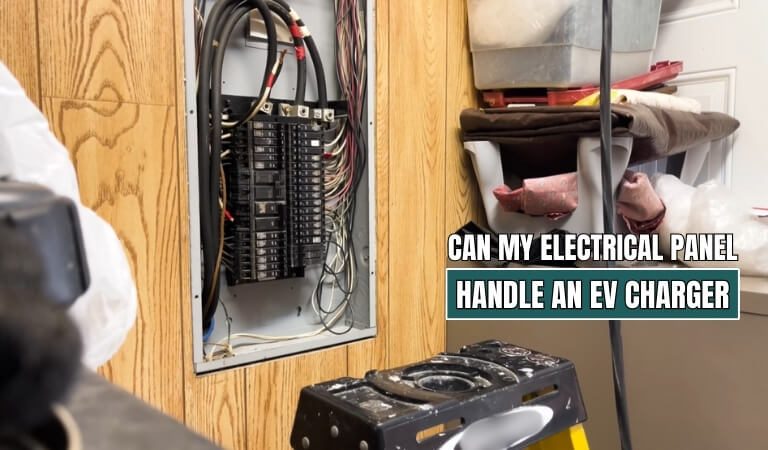
Panel Capacity
Your panel’s total capacity is a key factor in supporting an EV charger. A 200 amp or higher panel is ideal for Level 2 chargers. Lesser capacity panels might only support Level 1 chargers effectively. Ensure a professional evaluates your panel’s capacity before installation.
Charger Type
Level 1 chargers are more forgiving, requiring standard electrical outlets. Level 2 chargers, offering quicker charging, need more power and a dedicated circuit. Your choice between Level 1 and Level 2 will influence panel requirements. Assess your daily driving range to choose the right charger type.
Home Electrical System
The overall condition of your home’s electrical system plays a critical role. Older homes may need upgrades or inspections before adding an EV charger. Ensure your system is up to date and can handle additional loads. Regular maintenance helps detect potential issues early.
Circuit Availability
A crucial aspect to consider is the availability of free circuits in your electrical panel. Your EV charger will need its dedicated circuit to operate safely and efficiently. If your panel is already at capacity, you might need to upgrade or reorganize circuits. Consult with an electrician to determine the best approach for adding a new circuit for your EV charger.
Electrical Demand of Household
Assess the existing electrical demand of your household before adding an EV charger. High-demand appliances and systems can strain your electrical panel. If your home frequently uses high-power devices simultaneously, consider this when planning for an EV charger. An electrical upgrade may be necessary to safely accommodate the additional load.
With these factors in mind, you can ensure that your electrical panel is equipped to handle an EV charger. Always consult with a qualified electrician to evaluate your specific situation and provide guidance on the best steps to take for a safe and efficient installation.
How to Identify the Right Electrical Panel for an EV Charger?
Choosing the right electrical panel for your EV charger isn’t as daunting as it seems. Start by understanding your vehicle’s charging needs and your home’s current electrical capacity. A good match ensures efficiency and safety, paving the way for a smooth charging experience.
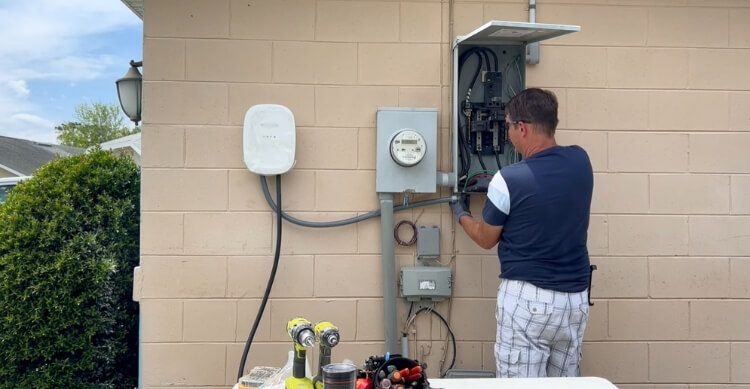
Assess Your Charging Needs
Consider how quickly you need to charge your EV daily. Faster charging requires Level 2 chargers and, consequently, a more robust electrical panel. Review your vehicle’s specifications and charging requirements. This assessment guides your panel upgrade decisions.
Evaluate Your Current Electrical Panel
Inspect your current electrical system’s age and capacity. Panels rated at 200 amps typically accommodate Level 2 chargers comfortably. If your panel is outdated or has lower capacity, consider an upgrade. Professional assessment is crucial for accurate evaluation.
Consult With a Professional
Hiring a certified electrician from an electric vehicle charging service provider like CrackPlatoon is always the safest approach. They can evaluate your home’s electrical system and recommend the appropriate upgrades. Their expertise ensures your setup complies with all safety standards. This step cannot be overlooked for safe and efficient installation.
Identifying the right electrical panel for your EV charger involves understanding your needs, evaluating your current setup, and seeking professional guidance. These steps ensure that your home is ready for the transition to electric vehicle charging. You should remember, that safety and efficiency are key in this process.
Benefits of Using the Right Electrical Panel for an EV Charger
Choosing the right electrical panel for your EV charger isn’t just a technical necessity; it’s a smart move for safety and efficiency. This decision can significantly impact your daily life and the performance of your electric vehicle. Ensuring you have the appropriate setup promotes peace of mind and optimal charging.
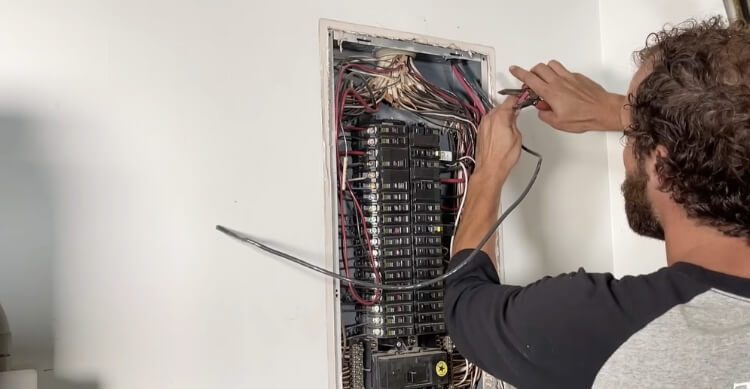
Enhanced Safety
Using the correct electrical panel reduces the risk of electrical fires and other hazards. It ensures your system can handle the load without overtaxing circuits. This safety measure protects not just your vehicle but your entire household. Regular checks and balances become a routine part of your electrical health.
Optimal Charging Speed
The right panel ensures your EV charges at the fastest possible rate. You’ll spend less time waiting and more time driving. Consistent, efficient charging extends the lifespan of your vehicle’s battery. Ultimately, this translates to fewer worries and more road trips.
Energy Efficiency
An adequately matched panel and charger optimize your home’s energy use. You’ll see fewer spikes in your electricity bill. Efficient energy use reduces your overall carbon footprint, contributing to environmental conservation. Plus, streamlined energy consumption supports the longevity of your home’s electrical infrastructure.
Future-Proofing Your Home
Upgrading to the correct panel prepares your home for future technological advancements. As EV technology evolves, your setup will remain compatible and efficient. This foresight can increase your property’s value and appeal. It also means less hassle and expense in future upgrades or modifications.
The benefits of selecting the right electrical panel for your EV charger extend far beyond mere compliance. They touch on safety, efficiency, and the forward-thinking that characterizes modern homeownership. So, make a well-informed choice to ensure your electric vehicle and home are perfectly in sync.
Consequences of Using the Wrong Electrical Panel For an EV Charger
Picking the wrong electrical panel for your EV charger is like wearing shoes that don’t fit: uncomfortable and risky. It’s not just about immediate consequences; long-term effects can also be damaging. Ensuring the right fit between your electrical panel and EV charger is crucial for safety and efficiency.
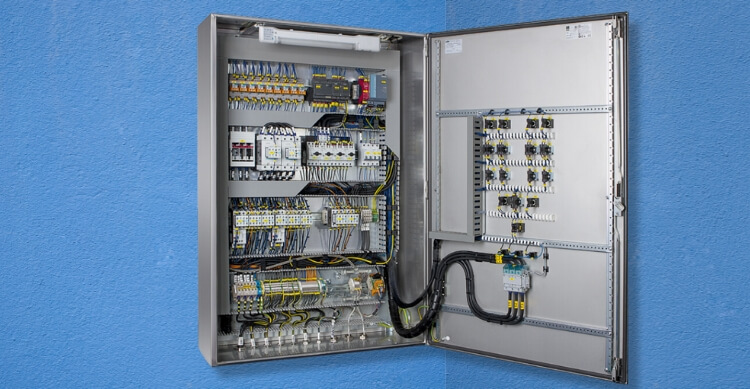
- Safety Hazards: Incorrect panels can overheat, posing serious fire risks. Regular system checks become vital to prevent dangerous situations.
- Inefficient Charging: An incompatible panel may lead to slower charging times. This inefficiency can disrupt your daily schedule and vehicle use.
- Electrical Damage: Overloading an unsuitable panel can cause damage to your home’s electrical system. Repair costs for such damage can be high and unexpected.
- Reduced EV Performance: Insufficient power supply may affect your EV’s battery life and performance. Ensuring proper charging conditions is crucial for maintaining vehicle health.
- Increased Costs: The wrong panel might increase electricity bills due to inefficient power use. Over time, this inefficiency can lead to significant financial loss.
The consequences of choosing the wrong electrical panel for your EV charger underscore the importance of making informed decisions. Not only does the right choice keep you safe, but it also ensures that your vehicle and home operate at their best. Remember, when in doubt, consulting with a professional can steer you in the right direction.
FAQs About Can My Electrical Panel Handle an EV Charger?
As electric vehicles become more common, questions about EV chargers and electrical panels are popping up everywhere. Below are concise answers to some frequently asked questions to help clear the air and guide your decisions.
Do You Need to Upgrade Your Panel for An EV Charger?
It depends on the existing electrical panel’s capacity and the requirements of the EV charger. If your current setup cannot support the additional load of a Level 2 charger, an upgrade is necessary. Level 1 chargers generally don’t require panel upgrades.
Can a 100 Amp Panel Handle an EV Charger?
A 100 amp panel can typically handle a Level 1 EV charger without issues. However, if you wish to install a Level 2 charger, it might be possible with careful load management and depending on other household electrical demands.
Can My Panel Handle a Tesla Charger?
Whether your panel can handle a Tesla charger depends on its current capacity and the overall electrical demands of your home. Tesla chargers, especially at higher settings, often require more power, which might necessitate an upgrade from older or lower-capacity panels.
How Much Does It Cost to Upgrade Electrical Panels?
The cost to upgrade an electrical panel varies widely, depending on the upgrade’s complexity and local labor rates. Prices can range from $1,500 to $4,000 or more, with additional costs for permits and inspections in your area.
How Do I Know How Many Amps My Panel Is?
You can determine your panel’s amperage by looking at the rating on the main breaker, which is typically located at the top of the panel. This breaker should have a number on it indicating its maximum amperage capacity, such as 100, 150, or 200 amps.
Closing Remarks
It is evident that charging electric vehicles is more than just plugging in; it is about making sure your home is equipped and safe. The question “Can my electrical panel handle an EV charger?” sits at the heart of this transition, underpinning the importance of matching your electrical infrastructure with the new demands of EV charging.
Making informed decisions based on your panel’s capacity and your EV’s requirements ensures not just a seamless integration but a future-proof, efficient home. As we move towards greener transportation, taking these steps ensures a smoother, safer journey into the electric future.
